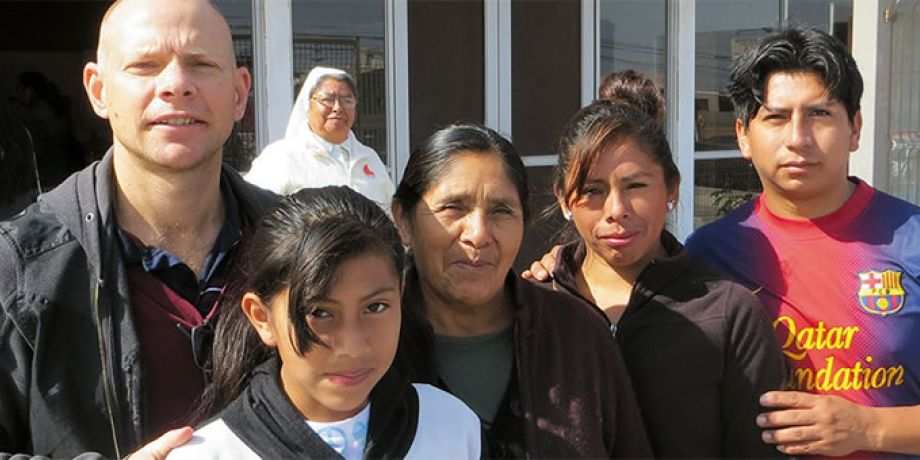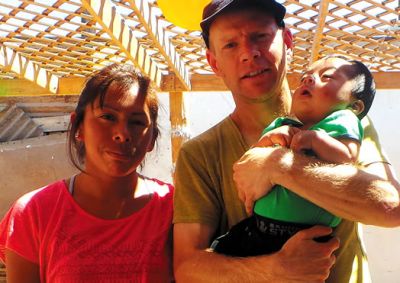
An Interview with Bolivian Migrant Patricia Rodriguez
Sitting down with Patricia Rodriguez amidst a noisy comedor (community center) bustling with activity, boisterous children, cats and dogs, she agrees to tell me about her life and experience since arriving in Chile. I translate her words from Spanish to English. A migrant from Bolivia she arrived in 2009 with her husband Rolando and baby Abigail. Now they have two children, Abigail aged 11 and Rafael aged 2. Originally from Cochabamba, a city nested in an Andean valley of central Bolivia, she left behind six sisters and a large extended family. Baby Rafael was born with a severe medical condition known as Trisomy 3, a rare chromosomal disorder. Just one of the many difficulties Rafael must battle is difficulty in breathing. Often, I hear him struggling to breathe lying in his baby carriage as the children scamper around him, oblivious to his trials, and big sister Abigail jumps attentively to his aid.

Patricia came to Chile looking for a better life explaining that "life for women can be very difficult where I come from. They have to work long hours for low wages and frequently encounter discrimination." Now she lives in Alto Hospicio, a mining town in the Atacama Desert. I fi rst met Patricia nearly three years ago in El Comedor Solidario, Fe y Esperanza in the shantytown beside where I live. In Chile a shantytown is known as a toma. Based in the Columban run parish of Sagrada Corazón, the comedor provides practical help in terms of assisting the nutritional needs of the residents, particularly the children, but also in community development, training courses for women and a meeting place for pastoral engagement. The comedor is very much in the heart of the community based in the reality of the living conditions of the locals. Although we do our best to maintain it in decent condition, it is still rough, dusty and dirty, a cramped space for a sink and gas stove, surrounded by high galvanised metal and plywood walls. Soon we hope to move to a recently built hall behind the parish church. Nevertheless, the women cook a wholesome meal with food donations, and they can feed up to 60 children and 20 adults at each meal.
As a coordinator in the comedor I have watched Patricia become increasingly involved in its activities and take on more of a leadership role. Her mother Filipa also helps. Patricia began attending around the same time as myself nearly three years ago and is now a regular cook in the kitchen and participates in short courses for the women. According to Patricia, "the comedor has been very important in helping to feed my family, especially when my husband cannot fi nd work. We also get other help in terms of clothes and necessities. It is a good place to meet people and catch up with friends."
Patricia's home in the toma is like the others. It is surrounded by thick, high plywood walls. Inside is a dusty space, a few meters square surrounded by makeshift rooms also built with sheets of timber. There are no windows, and the entrance is securely bolted. Security is always an issue here. Asked about life in the toma she says it has both good and bad aspects. "I have nice neighbors, and we help each other out. Also, it is our own place, for my own family, which I did not have in Bolivia. I bought this plot from the previous owner." Plots may exchange hands with high frequency in the toma as people come and go. "On the other hand, it can be difficult and dangerous here," she continues. "Sometimes they turnoff the light or water for up to a month. Without light I am afraid of fi res because we have to use candles."
Fires can spread with devastating speed and effect due to all the timber construction materials and houses squeezed on top of one another. "Crime is a big problem here as well and every night there are drug dealers on the streets. They can be as young as 13 years old. Sometimes there are gunshots, and we all must hide in our bedroom. The bullets can come through the walls. Unfortunately, it is illegal to build stronger, permanent houses in the toma."
"And what are your hopes for the future?" I ask. "What I want is an operation for my baby Rafael," she states emphatically. "He is on a waiting list, but they say it will be two or three more years. I would also love my own place, a permanent one like a house or apartment." It seems that Patricia won't be returning to Bolivia any time soon, especially with Rafael's condition.
Patricia attends the local parish church, and I ask her what her faith means to her. "My faith is everything to me," she replies. "It is my strength and my fortress. It helps me especially when I am overwhelmed with problems. As it says in the Bible, knock and the door will be opened to you. There are problems everywhere in the world, but life is beautiful. You only get one life, and it is important to use it well. Every day I wake up and thank God for my children and the life we have. God has brought me to Chile and I believe has a purpose for me." Perhaps it is all the help you are giving in the comedor, I suggest. A mischievous smile breaks across Patricia's face. "Perhaps," she laughs and goes off to help in the kitchen amidst all the noise and bustle.
Oisín Kenny is a Columban lay missionary in Chile.
Editor's Note: We are sad to report that Rafael passed away in 2018 due to complications from Trisomy 3. Patricia graciously allowed us to publish her story following her son's death. Our thoughts and prayers continue to be with Patricia.